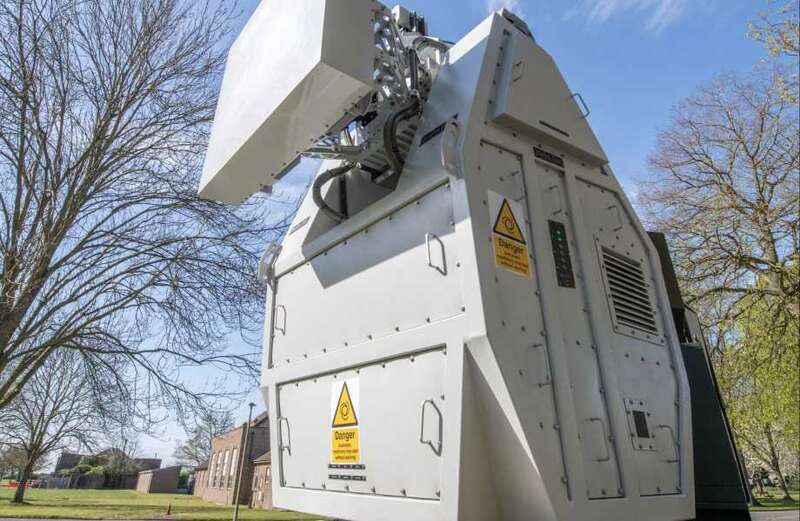BRAND new drone-killer technology designed and built in the UK will see a swarm of robo-planes blasted out of the sky for just 10p a shot.
The game-changing weapon, unveiled by the Ministry of Defence at midnight, is to be used by the UK's armed forces to disable enemies' electronics and destroy multiple drones at once.




The technology is currently under development and expected to be used by the UK's armed forces in the coming years, providing the UK with a "decisive operational advantage".
It will beam radio waves to disrupt or damage threats across land, air, and sea up to 1km away - although further development is hoped to see its range extended.
An example of a Radio Frequency Directed Energy Weapon (RFDEW), the system will be able to detect, track, and engage enemy vehicles, causing them to come to a grinding halt or fall out of the sky.
 Inside £30m doomsday bunkers with decontamination pod amid Putin nuke threat
Inside £30m doomsday bunkers with decontamination pod amid Putin nuke threat
The RFDEW beam will be able to down "dangerous drone swarms with instant effect", according to the Ministry of Defence, at a cost-effective price of 10p per shot fired.
Multiple threats can be engaged at once within the same beam, or a rapid fire of sequenced shots can strike at individual targets.
The technology will be able to be mounted on a variety of different military vehicles and will use a mobile power source to produce pulses of radio frequency energy.
The RFDEW system is a cheaper alternative to traditional missile-based air defence systems and can be operated by a single person.
British weapon "DragonFire" is more expensive at £10p a shot, but is expected to be ready for deployment by 2027 at the latest.
Defence Secretary Grant Shapps hinted last month that it could end up in Ukraine's hands even sooner, before they are "100 per cent perfect", with British soldiers set to test the weapon within weeks.
The DragonFire uses an intense light beam to cut through its target and can strike at the speed of light.
It is designed to shoot down attack drones, missiles, planes, and even satellites with its 50kW beam - and can engage with any visible target as small as a £1 coin.
Tonight's unveiling of the RFDEW system comes after Prime Minister Rishi Sunak announced an increase to the UK's defence budget to 2.5 per cent of GDP by 2030.
Defence experts hope the new technology will work to protect and defend the UK's critical assets and bases.
 Putin orders warship with 7,000mph missile 'on combat duty' as it heads to UK
Putin orders warship with 7,000mph missile 'on combat duty' as it heads to UK
Minister for Defence Procurement James Cartlidge said: "We are already a force to be reckoned with on science and technology, and developments like RFDEW not only make our personnel more lethal and better protected on the battlefield, but also keep the UK a world leader on innovative military kit.
"The war in Ukraine has shown us the importance of deploying uncrewed systems, but we must be able to defend against them too.
"As we ramp up our defence spending in the coming years, our Defence Drone Strategy will ensure we are at the forefront of this warfighting evolution."
The new technology - which will be tested in the field by soldiers over the summer - is being developed by a joint team from the Defence Science and Technology Laboratory (Dstl) and Defence Equipment & Support (DE&S).
Both organisations are working with UK industry under Project Hersa.
Dstl Chief Executive, Paul Hollinshead said: "These game changing systems will deliver decisive operational advantage to the UK armed forces, saving lives and defeating deadly threats.
"World class capabilities such as this are only possible because of decades of research, expertise and investment in science and technology at Dstl and our partners in UK industry."
THE DRAGONFIRE
Soldiers are also set to test the DragonFire laser guns and a new type of radar beam weapon.
The lasers can heat their targets to over 3,000 degrees Celsius in an instant, while the radio weapons work by blasting a pulse of energy which fries electric circuits - causing drones to drop out of the sky.
Both systems were developed at the government’s top secret Porton Down laboratory in Wiltshire and were due to be trialled by troops from the 7th Air Defence Group, based at Thorney Island, Hants.
Matt Cork, the boss of Porton Down's directed energy weapons demonstration programme, said the radio weapon can destroy "a room full of computers or a telephone exchange".



It does so by blasting an electro-magnetic pulse that overloads its target's electrics.
He added: "Anything that has electricity flowing through it, you can disrupt it."
A version of the radio weapon is to be mounted on a military truck and tested this summer, before the laser weapon is tested by the Royal Artillery in the autumn.
The laser weapon, known as DragonFire, has already been fired from a Royal Navy warship.
The MoD said the DragonFire would be fitted to Royal Navy warships by 2027 at the latest - five years ahead of schedule.
The Sun understands the lasers will be most likely fitted to frigates.
Incredible declassified footage released by the Ministry of Defence in March showed the formidable weapon being used to strike targets in Scotland’s Outer Hebrides.
The video demonstrated the laser's impressive ability to lock onto a target and destroy it with a powerful beam fired into the sky.





































